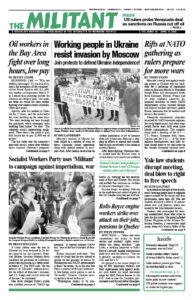AUCKLAND, New Zealand — Students in the Indian state of Karnataka have mounted protests after the state’s high court March 15 upheld a government ban on young women wearing headscarves in schools and colleges.
Muslim students from several parts of the state took to the streets the following day. Shopkeepers in Bhatkal shut their stores in solidarity. Authorities previously imposed a colonial-era law to ban gatherings of more than four people in some parts of the state.
“We won’t take off the hijab,” Ayesha Imthiaz told Reuters. “We have fifth semester exams next month. We will have to sit that out unless things change.”
She is one of a group of students at a high school in Udupi who were banned from wearing hijabs in class in January. They have been attending school every day since, but authorities prevent them from going into the classroom.
They also had to confront supporters of the ban who have mobilized outside the school wearing saffron scarves, a symbol of the country’s largest religion, Hinduism. The Hindu-nationalist Bharatiya Janata Party state government backed the school ban.
The court claims that wearing headscarves is not “essential” to Islam. The six petitioners against the ban condemned the high court order as unconstitutional. Its ruling will be challenged in the country’s supreme court.
The ban has been met with widespread debate across the country, where 200 million people — some 14% of the population — are Muslim. State authorities in Karnataka closed schools for several days in mid-February to try to quell protests.
Last month Chandini Naz quit her job at a government school in Karnataka after being told to remove her hijab in the classroom for the first time in her three years of teaching there.
The ruling follows other discriminatory moves targeting Muslims by the Hindu-nationalist government of Prime Minister Narendra Modi. In 2020 it passed the sectarian Citizenship Amendment Act, which makes religion a criterion for deciding who will be offered Indian citizenship and openly discriminates against Muslims.
Opposing the school ban, 40 people joined a Feb. 26 protest outside the Indian Consulate here called by Aotearoa Alliance of Progressive Indians.

